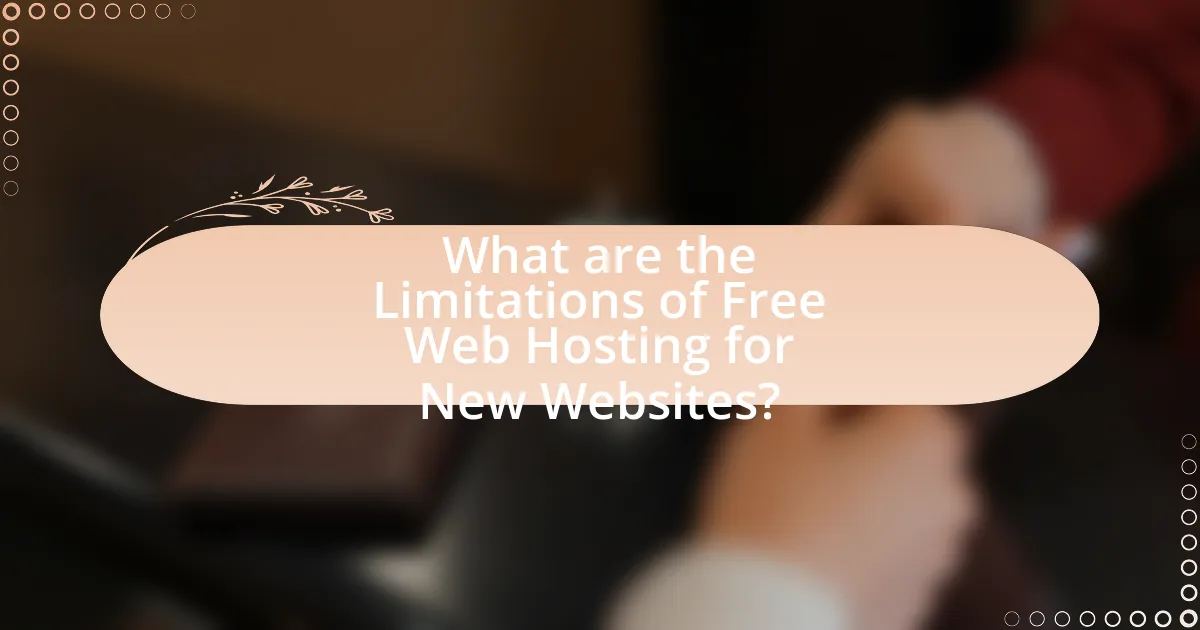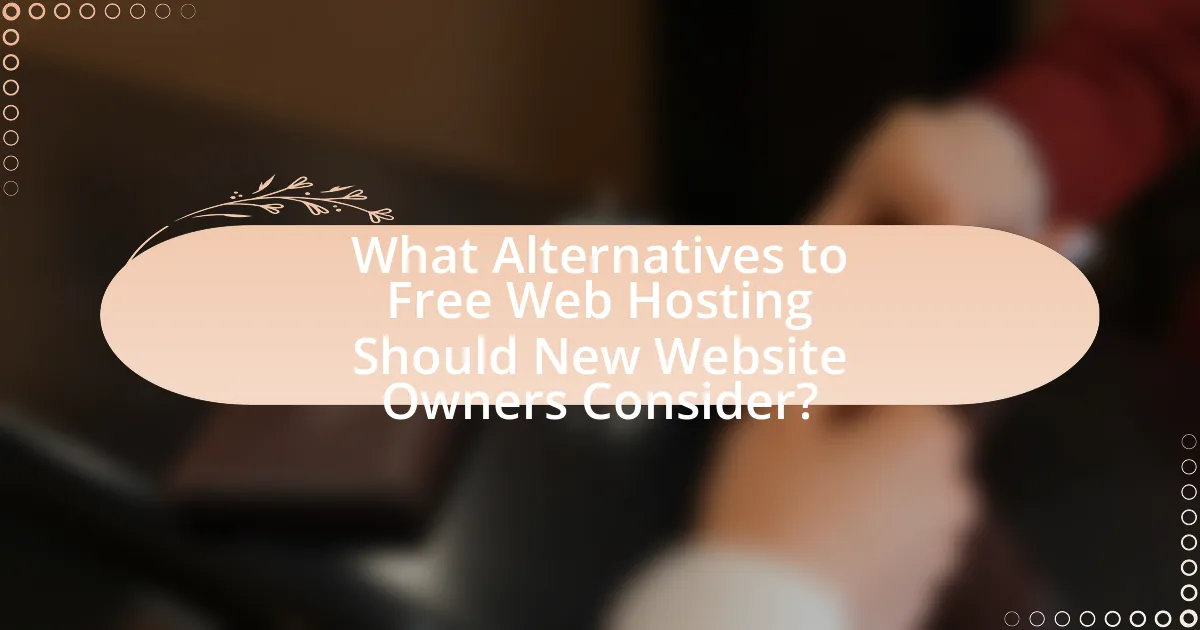The article focuses on the limitations of free web hosting for new websites, highlighting key constraints such as restricted storage space, limited bandwidth, lack of customer support, and the presence of advertisements. It contrasts free hosting services with paid options, emphasizing the trade-offs in features, reliability, and support. The discussion includes the impact of resource limitations on website performance, security risks associated with free hosting, and the challenges new website owners face, such as downtime and SEO limitations. Additionally, the article explores alternatives to free hosting, including paid services and best practices for selecting a suitable hosting plan.

What are the Limitations of Free Web Hosting for New Websites?
Free web hosting for new websites has several limitations, including restricted storage space, limited bandwidth, lack of customer support, and the presence of advertisements. These constraints can hinder website performance and user experience. For instance, many free hosting services offer only a few hundred megabytes of storage, which is insufficient for media-rich sites. Additionally, bandwidth limitations can lead to slow loading times or downtime during traffic spikes. The absence of reliable customer support can leave users without assistance when technical issues arise. Furthermore, free hosting often includes mandatory ads, which can detract from the site’s professionalism and user engagement. These factors collectively make free web hosting less suitable for serious or growing websites.
How do free web hosting services differ from paid options?
Free web hosting services differ from paid options primarily in terms of features, reliability, and support. Free services often come with limited storage, bandwidth, and functionality, while paid options provide more resources, enhanced performance, and additional features such as custom domain names and advanced security measures. For instance, a study by HostingAdvice found that free hosting typically lacks customer support and may display ads on user sites, whereas paid hosting offers 24/7 support and an ad-free experience. This distinction highlights the trade-offs between cost and quality in web hosting services.
What features are typically lacking in free web hosting plans?
Free web hosting plans typically lack essential features such as custom domain names, sufficient storage space, bandwidth limits, and customer support. Custom domain names are often replaced with subdomains, which can undermine professionalism. Storage space is frequently minimal, restricting the amount of content that can be hosted. Bandwidth limits can lead to slow loading times or downtime during high traffic periods. Additionally, customer support is usually limited or non-existent, making it difficult for users to resolve issues. These limitations can hinder the growth and functionality of new websites.
How do resource limitations impact website performance?
Resource limitations significantly degrade website performance by restricting the availability of essential computing resources such as bandwidth, storage, and processing power. When a website operates under constrained resources, it experiences slower load times, increased latency, and potential downtime, which can lead to a poor user experience. For instance, a study by Google found that a one-second delay in load time can result in a 20% decrease in conversions, highlighting the critical nature of resource allocation. Additionally, limited bandwidth can cause bottlenecks during high traffic periods, further exacerbating performance issues. Therefore, inadequate resources directly correlate with diminished website efficiency and user satisfaction.
What security risks are associated with free web hosting?
Free web hosting poses several security risks, including data breaches, malware infections, and lack of support for security updates. Users of free hosting services often share server resources, making them vulnerable to attacks that can compromise multiple sites simultaneously. Additionally, many free hosting providers do not implement robust security measures, such as firewalls or encryption, which increases the likelihood of unauthorized access to sensitive information. According to a 2021 report by the Cybersecurity & Infrastructure Security Agency, shared hosting environments are particularly susceptible to cross-site scripting and SQL injection attacks, further highlighting the inherent risks associated with free web hosting.
How does lack of support affect website security?
Lack of support significantly undermines website security by leaving vulnerabilities unaddressed and increasing the risk of cyberattacks. Without timely updates, security patches, and expert guidance, websites become susceptible to exploits that can compromise sensitive data. For instance, a study by the Ponemon Institute found that 60% of small businesses that experience a cyberattack close within six months, highlighting the critical need for ongoing support to mitigate risks. Additionally, free web hosting services often provide minimal security measures, making it essential for users to have access to professional support to enhance their website’s defenses against potential threats.
What vulnerabilities are common in free hosting environments?
Common vulnerabilities in free hosting environments include lack of security updates, limited customer support, and shared resources leading to potential data breaches. Free hosting services often do not prioritize regular security patches, making websites susceptible to exploits. Additionally, the absence of dedicated support can delay responses to security incidents. The shared nature of resources in free hosting can expose websites to risks from neighboring sites, as vulnerabilities in one can affect others. According to a 2021 study by the Cybersecurity & Infrastructure Security Agency, shared hosting environments are significantly more prone to attacks, highlighting the inherent risks associated with free hosting solutions.
Why is customization limited in free web hosting?
Customization is limited in free web hosting due to resource constraints and the need for providers to monetize their services. Free hosting services often operate on shared servers, which restrict the amount of server resources available to each user, leading to limitations in features and functionalities. Additionally, providers may impose restrictions on customization options to encourage users to upgrade to paid plans, where more extensive features and greater flexibility are offered. This model allows providers to sustain their business while offering basic services for free, but it inherently limits the level of customization available to users.
What restrictions do free hosting services impose on website design?
Free hosting services impose several restrictions on website design, including limited storage space, bandwidth caps, and the inability to use custom domain names. These limitations often result in a lack of flexibility in design choices, as users may be restricted to predefined templates and themes. Additionally, many free hosting providers display ads on user websites, which can detract from the overall design and user experience. Furthermore, some services may restrict the use of certain programming languages or content management systems, limiting the functionality and customization options available to users.
How does limited control affect branding and user experience?
Limited control negatively impacts branding and user experience by restricting customization options and reducing the ability to create a unique identity. When businesses use free web hosting, they often face limitations on design, functionality, and domain name choices, which can lead to a generic appearance that fails to resonate with target audiences. For instance, a study by the Nielsen Norman Group highlights that users are more likely to trust and engage with websites that exhibit a professional design and branding consistency. Consequently, limited control can result in a diminished user experience, as visitors may perceive the site as less credible or reliable, ultimately affecting conversion rates and customer loyalty.

How do Free Web Hosting Limitations Affect New Website Owners?
Free web hosting limitations significantly hinder new website owners by restricting essential features such as bandwidth, storage, and customer support. These constraints can lead to slow website performance, limited scalability, and potential downtime, which negatively impacts user experience and search engine rankings. For instance, many free hosting services impose bandwidth caps that can result in a website becoming inaccessible during traffic spikes, thereby losing potential visitors and revenue. Additionally, the lack of customer support can leave new owners without assistance during critical issues, further complicating their ability to manage and grow their online presence.
What challenges do new website owners face with free hosting?
New website owners face several challenges with free hosting, including limited storage and bandwidth, which can hinder website performance and scalability. Free hosting services often impose restrictions on resources, leading to slow loading times and potential downtime during traffic spikes. Additionally, these services frequently display ads on users’ websites, detracting from the professional appearance and user experience. Security is another concern, as free hosting providers may lack robust security measures, making websites vulnerable to attacks. Furthermore, customer support is typically minimal or non-existent, leaving new owners without assistance when issues arise. These factors collectively limit the effectiveness and reliability of free hosting for new website owners.
How can downtime impact a new website’s credibility?
Downtime can significantly undermine a new website’s credibility by creating a perception of unreliability among users. When a website experiences frequent or prolonged outages, visitors may question the site’s professionalism and trustworthiness, leading to a loss of potential customers. Research indicates that 47% of consumers expect a web page to load in two seconds or less, and 40% will abandon a site that takes longer than three seconds to load. This expectation highlights the critical nature of uptime in maintaining user trust. Furthermore, search engines like Google factor website reliability into their ranking algorithms, meaning that downtime can also negatively impact a site’s visibility and search engine optimization efforts.
What are the implications of limited bandwidth for growing websites?
Limited bandwidth for growing websites can severely restrict their performance and user experience. When a website exceeds its bandwidth limit, it may experience slow loading times or become temporarily inaccessible, leading to potential loss of visitors and revenue. According to a study by Google, a one-second delay in page load time can result in a 20% decrease in conversion rates. Additionally, limited bandwidth can hinder the ability to handle increased traffic, which is crucial for growth, as websites may struggle to accommodate spikes in user activity during promotions or viral content. This limitation can ultimately stifle a website’s scalability and competitiveness in the digital landscape.
How does free web hosting influence SEO and online visibility?
Free web hosting negatively influences SEO and online visibility due to several inherent limitations. Websites hosted on free platforms often experience slower loading times, which can lead to higher bounce rates and lower search engine rankings, as page speed is a ranking factor for Google. Additionally, free hosting services frequently impose restrictions on bandwidth and storage, limiting the website’s ability to handle traffic and content, which can further hinder visibility.
Moreover, free hosting often includes ads and subdomains, which can detract from the site’s professionalism and credibility, leading to decreased user trust and engagement. According to a study by Backlinko, websites with custom domains rank higher in search results compared to those on subdomains. Therefore, the combination of slower performance, limited resources, and lack of professionalism associated with free web hosting significantly undermines a website’s SEO potential and overall online visibility.
What SEO limitations are inherent in free hosting services?
Free hosting services inherently limit SEO effectiveness due to factors such as lack of custom domain names, slow loading speeds, and potential downtime. These services often require users to use subdomains, which can dilute brand identity and hinder search engine rankings. Additionally, free hosts may impose bandwidth restrictions, leading to slower site performance, which negatively impacts user experience and SEO rankings. Furthermore, these platforms may not provide essential SEO tools or analytics, limiting users’ ability to optimize their sites effectively. Studies show that websites with faster loading times and custom domains rank higher in search results, underscoring the disadvantages of free hosting for SEO.
How can poor performance affect search engine rankings?
Poor performance can significantly lower search engine rankings by negatively impacting user experience and site metrics. Search engines prioritize websites that load quickly and provide a seamless experience; thus, slow-loading pages can lead to higher bounce rates, which signals to search engines that the content may not be relevant or valuable. According to Google, page speed is a ranking factor, and studies show that a one-second delay in load time can reduce conversions by 7%. Therefore, websites hosted on free platforms often suffer from slower performance due to limited resources, which can directly result in diminished visibility in search engine results.

What Alternatives to Free Web Hosting Should New Website Owners Consider?
New website owners should consider paid web hosting services, cloud hosting, and managed WordPress hosting as alternatives to free web hosting. Paid web hosting typically offers better performance, reliability, and customer support compared to free options, which often come with limitations such as bandwidth restrictions and ads. Cloud hosting provides scalability and flexibility, allowing websites to handle varying traffic loads efficiently. Managed WordPress hosting is tailored for WordPress sites, offering optimized performance and security features. According to a 2021 survey by HostingAdvice, 70% of users reported improved site performance after switching from free to paid hosting, highlighting the advantages of investing in quality hosting solutions.
What are the benefits of choosing a paid web hosting service?
Choosing a paid web hosting service offers enhanced reliability, security, and customer support compared to free options. Paid services typically provide guaranteed uptime, often exceeding 99.9%, which ensures that websites remain accessible to users. Additionally, they offer robust security features, including SSL certificates and regular backups, protecting websites from data breaches and loss. Furthermore, paid hosting plans usually include dedicated customer support, allowing users to resolve issues quickly and efficiently. According to a 2021 survey by HostingAdvice, 70% of users reported that paid hosting services significantly improved their website performance and security compared to free hosting alternatives.
How does improved performance enhance user experience?
Improved performance enhances user experience by reducing load times and increasing responsiveness, which leads to higher user satisfaction. Faster websites decrease bounce rates; for instance, a study by Google found that a one-second delay in mobile load times can reduce conversions by up to 20%. Additionally, improved performance allows for smoother interactions, enabling users to navigate seamlessly, which is crucial for retaining visitors and encouraging engagement. Overall, enhanced performance directly correlates with positive user experiences, as evidenced by user behavior analytics that show a preference for faster, more efficient websites.
What security features are typically included in paid hosting plans?
Paid hosting plans typically include security features such as SSL certificates, firewalls, DDoS protection, malware scanning, and regular backups. These features enhance the overall security of websites by encrypting data, preventing unauthorized access, mitigating attacks, scanning for vulnerabilities, and ensuring data recovery in case of incidents. For instance, SSL certificates encrypt data transmitted between the user and the server, which is crucial for protecting sensitive information. Firewalls monitor and control incoming and outgoing network traffic based on predetermined security rules, while DDoS protection helps to safeguard against distributed denial-of-service attacks that can overwhelm a website. Regular backups ensure that data can be restored in the event of data loss or corruption, providing an additional layer of security for website owners.
How can new website owners find affordable hosting options?
New website owners can find affordable hosting options by researching and comparing various hosting providers that offer budget-friendly plans. Many reputable companies, such as Bluehost, HostGator, and SiteGround, provide shared hosting plans starting as low as $2.95 per month, which is suitable for beginners. Additionally, using comparison websites like HostingAdvice or CNET can help users evaluate features, pricing, and customer reviews, ensuring they select a hosting service that meets their needs without overspending.
What factors should be considered when comparing hosting plans?
When comparing hosting plans, key factors to consider include performance, scalability, security, customer support, and pricing. Performance is crucial as it affects website speed and uptime; for instance, a study by Google indicates that a one-second delay in page load time can reduce conversions by 20%. Scalability ensures that the hosting plan can accommodate growth, allowing for increased traffic without service interruption. Security features, such as SSL certificates and regular backups, protect against data breaches, which are increasingly common; according to IBM, the average cost of a data breach in 2021 was $4.24 million. Customer support quality can significantly impact troubleshooting and maintenance, with 24/7 support being ideal for businesses. Lastly, pricing should reflect the features offered, ensuring that the plan provides good value without hidden costs.
How can promotional offers help reduce hosting costs?
Promotional offers can significantly reduce hosting costs by providing discounts or free services for a limited time. These offers often include reduced rates for the first year or additional features at no extra charge, allowing businesses to save money while establishing their online presence. For instance, many hosting providers offer promotional pricing that can be as much as 50% off the regular price, which directly lowers the initial investment required for web hosting. This financial relief is particularly beneficial for new websites that may have limited budgets, enabling them to allocate resources to other critical areas such as content creation and marketing.
What are the best practices for new website owners when selecting hosting?
New website owners should prioritize reliability, scalability, and customer support when selecting hosting. Reliable hosting ensures minimal downtime, which is crucial for maintaining user engagement and search engine rankings. According to a study by HostingFacts, 99.9% uptime is the industry standard for reputable hosting providers. Scalability allows the website to grow without needing a complete migration to a different host, which can be disruptive. Additionally, responsive customer support is essential for resolving issues quickly; a survey by InMotion Hosting found that 70% of users value support availability. Therefore, focusing on these factors will help new website owners choose the right hosting solution.